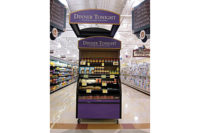Brothers Doug and Steve Feldkamp are musing on the properties of milk, which has a shelf life of about 18 to 21 days. Three weeks is both good and bad, say the owners of Umpqua Dairy Products Co., Roseburg, Ore. It’s bad that the time between manufacturing and delivery is so short that every step in the process has to be accomplished timely and efficiently. But it’s good because the products need to be continuously replenished. Doug Feldkamp is the chief executive officer. Older brother Steve is chief operating officer.
Umpqua Dairy actually promises a 21-day shelf life and goes one step further, guaranteeing an extra five days beyond the date stamped on the package. That is how confident it is of its processing quality. A measure like this is one reason the small, family-owned business can compete and thrive in a competitive dairy landscape.
“They put a tremendous emphasis on quality,” said Oregon State University Professor Lisbeth Goddik of the Feldkamps. “They have to compete on quality” because higher-volume processors can offer lower prices, she added.
It seems as if every dairy processor boasts of its quality, but Umpqua Dairy has the hardware to prove it. The dairy earned the 2013 Production Excellence Award from Quality Chekd Dairies Inc., a member-owned organization of 27 independent dairy processors in the United States, Guatemala and Colombia. The award honors the best single production plant within the Quality Chekd organization, which includes 59 plants. Criteria include laboratory test scores and evaluation of a plant’s process systems for assuring product quality.
Low-priced competitors are not the only obstacle Umpqua Dairy is up against. It competes in sparsely populated markets, so there are not a lot of customers or milk consumers in any one place. Hometown Roseburg has a population of about 22,000. The distances from the processing plant to customers are great and the profit margins are thin.
All of that forces the Feldkamp brothers and their management team to watch costs, invest in automation, be strategic about entering new markets and insist on producing the highest-quality and longest-lasting dairy products.
Products for retailers, foodservice
Umpqua is a full-line processor of Grade A dairy products. Besides processing fluid milk, cream and eggnog, the dairy makes cottage cheese, sour cream and butter. Its frozen products include ice cream, sherbet, frozen yogurt and Greek frozen yogurt. Nondairy beverages are fruit punch, Florida orange juice and a juice drink called Frutesca.
Umpqua serves the retail, foodservice and private label markets. About 75% of the business is retail and the remainder in foodservice, including programs in schools and hospitals. One customer, a regional grocer, sells the dairy’s ice cream products in its stores in Washington, Idaho, Nevada, Utah, Arizona, California and Oregon. Distributors take products to those states as well as Wyoming, Montana and Alaska. The dairy manufactures ice cream mix for Dairy Queen stores in Oregon, Washington and Alaska.
I asked the Feldkamps what it means to be from Oregon. They said it means being proud of the Pacific Northwest, focusing on sustainability, being stewards of the land, participating in outdoor activities and making (and enjoying) good food. They point to the state’s wineries, microbreweries and cheesemakers, singling out the award-winning Rogue Creamery, 90 minutes south in Central Point.
“Quality” and “local” are two words that keep popping up in conversations with Umpqua managers. The Feldkamps’ father, the second-generation owner, stressed quality.
Umpqua plays up its local roots in its support of community events (like county fairs and 4-H auctions) and organizations (including Boy Scouts of America, Boys and Girls Clubs, and the Family Development Center). The processor also participates in events benefitting the Children’s Miracle Network, following the lead of Dairy Queen, which is a supporter. The dairy has seven distribution centers outside of Roseburg. Each of these is involved in its respective community.
“In our area, local is good,” said Doug.
When a nearby casino wanted a signature ice cream to serve in its restaurants, it turned to Umpqua, which created a hazelnut, honey and huckleberry recipe. The dairy also makes Beaver Tracks and Duck Tracks flavors, a nod to the mascots of Oregon State University and the University of Oregon, respectively.
“The value [of Umpqua Dairy] is in our brand,” Steve said. “People tell us: We love your ice cream.”
In fact, it is Umpqua’s frozen products that are going to help the dairy processor expand beyond the Pacific Northwest. Ice cream and frozen yogurt travel well and have a longer shelf life than fluid milk. The company’s wide variety of year-round and seasonal flavors keeps consumers coming back for their favorites and to try new flavors.
A bump in the road
In the summer of 2010, Umpqua Dairy faced a crisis. An outbreak of Salmonella braenderup, traced to the dairy crate handling system, forced the dairy to recall milk, half-and-half, cream, buttermilk and nondairy beverages. Quality Chekd’s CEO Peter Horvath said the company bounced back quickly.
Oregon State Professor Goddik said the way in which Umpqua handled the recall created goodwill with customers. She also noted that Oregon’s close-knit dairy community rallied to support one of its own. Competitors stepped in and co-packed milk while Umpqua corrected the problem. Goddik wondered if that would happen anywhere else.
The recall is one example of how business can change overnight. Other changes happen more gradually, but can be no less game changing. Take the rise in popularity of coffee and its consumption throughout the day, not just at breakfast. Who would have thought that fluid milk would benefit from consumer demand for another beverage?
“The coffee industry has been a boon to dairy,” said Director of Sales and Marketing Marty Weaver, noting that the drive-up coffee stands found throughout Oregon are big purchasers of half-and-half and cream.
Then there is the popularity of Greek yogurt. Food companies are adding the cultured dairy product to breakfast cereal, snack bars, dips, dressings and butter. This year, Umpqua Dairy launched frozen Greek yogurt in 56-ounce and 3-gallon containers.
New ideas
To stay on top of trends and to react to them, an innovation team meets monthly. Members represent purchasing, production and sales. They analyze the market and decide on new products, equipment needs and marketing direction. Frozen Greek yogurt came out of the innovation team. (The dairy had been manufacturing a nonfat frozen yogurt.) The company called in suppliers to help them develop three flavors. The items were line priced and introduced in April.
Goddik noted that Umpqua makes decisions quickly because of its small size and lack of bureaucracy.
Besides reacting to industry trends, Umpqua Dairy responds to consumers concerns. Decisions to source rBST-free milk, replace high-fructose corn syrup with a sucrose and fructose blend (in school milk and eggnog), develop a cleaner label, reduce sodium in cottage cheese and use an anti-UV white gallon jug were all based on consumer comments.
Cold calling, customer service
Just as it listens to consumers, Umpqua stays close to customers. Three of the most useful tools in the dairy’s sale kit are shoe leather, a telephone book and a spoon. Cold calling is easier in southern Oregon where Umpqua is known, Weaver acknowledged.
Whenever Weaver and his sales staff hear of a new restaurant, they are on the phone or knocking on the door, talking to the chef about Umpqua’s offerings. A spoonful of cottage cheese or a taste test of another product is usually enough to convince customers.
Umpqua Dairy has won awards for product quality from Quality Chekd, the Wisconsin Dairy Products Association and Oregon State University, among others.
“The product gets us in the door,” Weaver said, but it is the customer service that keeps the account, he added.
Marketing
Umpqua Dairy’s strategic focus and attention to detail also is seen in its marketing and advertising efforts. The dairy supports its retail customers by buying its own media advertisements and taking co-op ads with retailers. Besides newspaper ads, the dairy processor uses in-store demonstrations, point-of-sale advertising, television, radio and billboards. It won 13 marketing awards from Quality Chekd in 2013.
Advertising is becoming more expensive, noted Marketing Coordinator Tamara Osborne. To stretch the marketing budget, the dairy is doing more full-family ads to promote the line. It also uses online digital ads when appropriate.
“But each customer is different,” Osborne said. The small independent stores in south Oregon depend upon the weekly shopper ads, she said.
Umpqua has embraced social media. The company prints the Facebook logo on the seal over its cottage cheese, so that when a consumer removes the overcap, she sees the social media address. The dairy prints a QR (quick response) code on all of its ice cream promotional materials. When the code is scanned with a smart phone, a quick-loading page promoting the flavor of the month pops up. The dairy’s Facebook page had nearly 2,200 likes as of mid-September; its YouTube channel features ads for milk, sour cream and cottage cheese. Umpqua Dairy re-vamped its website late this summer. In addition to the usual company history and product information, the site includes recipes.
Taking the reigns
A popular vehicle at county fairs is a dairy-white 1931 Model A truck painted with the Umpqua logo. In 1931, Herb Sullivan and Ormond Feldkamp (Steve and Doug’s grandfather) started the business, which was then passed on to Ormond’s son, Barton. Steve and Doug worked in the dairy during summers, but becoming a dairyman was not the career path either had in mind when they graduated from Oregon State University. Steve studied marine biology and moved to California. Doug studied business and the self-described ski bum found work at a ski resort as an auditor.
Then their father took ill. Doug returned to the company in January 1985 and served in a variety of positions until being named president in 1989 at age 28. Steve came back in 1988 at age 31. Their father died at age 58 from kidney cancer and soon thereafter, other employees retired or passed away. In one year, the company lost 285 years of combined dairy experience.
Doug and Steve were in charge. They were the youngest and least experienced members on staff. What they did have were hard-working employees and a culture that valued quality and service. This is what the Feldkamps said helped them through the learning curve of running a dairy business. They acquired some dairies and made a big push from 1998 to 2005 to get more sales. At capital budget meetings, they developed a wish list of projects, and then prioritized the equipment and technology needs. The Feldkamps continue to invest in the plant every year.
An information technology project made a huge difference in productivity and profitability. The enterprise resource planning initiative launched in 2006 that linked headquarters with outlying depots wasn’t universally popular and was difficult to live through, Steve recalled. But he and the rest of the management team are happy with the results. The ERP project, which encompassed internal reporting, e-mail and handheld devices, networked the company and sales depots.
The hand-held devices have paid for themselves. Previously, route drivers wrote out invoices. With the hand-helds, they enter quantities and print a ticket for the customer. Umpqua cut paper expenses by half, Steve estimated. “We don’t take paper back to the office,” he said.
At the end of the day, the driver places the device in a docking port at the depot and all the data is transferred to a mainframe in Roseburg. One result is that inventory control is better than ever. Another result is that Umpqua now has an IT department, which needs to be funded every year.
Employees make the difference
Umpqua Dairy is an employer of choice in Roseburg, said Human Resource Manager Stephanie Smith. It competes for employees with the timber industry, hospitals, schools and the casino. The dairy’s employee benefits include life insurance, long- and short-term disability, a 401(k) and profit sharing. Job candidates are interviewed by dairy employees. Those who make the cut face an interview with Doug or Steve. The brothers don’t rubber-stamp a recommendation, and have turned down applicants.
Whenever they can, the Feldkamps promote employees through the ranks. Managers develop coaching and improvement plans to move employees up the ladder to positions with increasing responsibilities.
The Feldkamps do all they can to foster a feeling of family and teamwork. E-mail and voice mail make it easy for an owner to avoid personal contact with the rank and file. That’s not the brothers’ style. On pay day, Doug or Steve personally hand out paychecks in the office and plant. Why? “It shows that we’re approachable,” Doug said.
The outlying depots hold quarterly sales meetings and Doug and Steve attend at least one a year. The personal touch extends to cards signed by Doug on employee birthdays. Also noted are high school graduations of employees’ children and the birth of employees’ children or grandchildren. One Friday a month throughout the summer, the dairy holds a two-hour barbecue and invites drivers and vendors along with employees. At the annual holiday party, the Feldkamps honor employees with service awards.
Perhaps the care and feeding of employees is an acknowledgement of the help Doug and Steve received when they started out. They were inexperienced dairymen who relied on veteran employees to produce the products and keep quality high. Today, the brothers have nearly 30 years each under their belts. They know what it takes to run a successful dairy: quality milk and quality employees to turn it into award-winning foods and beverages.
The Quality Chekd organization and the Wisconsin Dairy Products Association have recognized Umpqua Dairy with awards for quality. Oregon’s dairy industry also values the owners of the business. “These are two very-respected gentlemen,” Goddik said.













